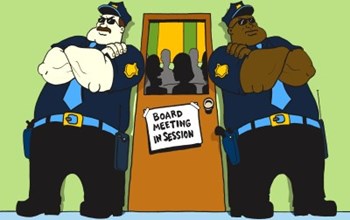
When Bob Madison, a unit owner on the Upper West Side of Manhattan, tried to contact a board member to talk to them about an ongoing problem he had in the building, he was told "board members don't give out their e-mail addresses." He was told the same thing when he asked about their phone numbers. He was forced to contact the building manager for board matters, and then wait for a response.
As an 18-year resident of a more intimate 10-story building with only thirty apartments, Madison was stumped. Communicating with a board for this smaller property should be easier than this, he thought. Unfortunately, the board's lack of communication with the residents had led to some acrimony in the building, which is definitely not a positive way for a board of directors to work with the residents.
Laura Baddish, a Passaic County, New Jersey resident knows that when she has a problem in her building she should contact the management company. When a particular repair and billing issue of hers was not resolved, she took her complaint to a higher authority—her board of directors. Unfortunately, she didn't get the response she had hoped for there either.
"My stack of papers on this is about two inches high," says Baddish. "The board was so unresponsive; the management company would print out computer generated invoice after invoice with no explanations. Additionally, they would hold checks forcing late charges to occur. I have since resorted to sending checks return receipt."
These are just two examples of poor communication between the board and its residents. Unfortunately, when the lines of communication break down at any point, problems and animosity are the almost unavoidable result.
In this case, the board of directors' lack of communication with the owners, and other issues, ultimately led to their replacement, but Baddish, president of The Baddish Group, a public relations and marketing corporation, knows what she would have done that the board didn't.
"Being in the service business, I would have responded immediately," she says. "Also, the homeowners are willing to pay a higher fee in exchange for better service."
Communication Breakdown
Nan Andrews Amish, a communications consultant in Northern California, says that there are reasons why the board may not communicate well.
"One of the issues with association boards is that they typically are not professional managers, nor are they required to be skilled in community relations or communications, or for that matter finance or real estate to serve on the boards," says Amish. "Many board members get overwhelmed with communications from residents/shareholders and they tend to not communicate. They often just make decisions and then issue dictates based upon decisions, which often do not have any input from other residents."
Of course, how the board responds may depend on the building's or HOA's bylaws.
"The issue of how to handle day-to-day complaints depends on the nature of the complaint itself," says Eric D. Sherman, a real estate attorney at the law firm of Pryor Cashman LLP in Teaneck. "The first step is ascertaining whose responsibility it is to address the complaint. The answer to that question most often is found in the relevant lease and bylaws."
Assuming it's the board's responsibility, Sherman says, it will almost always be the managing agent who attends to the complaint.
"It is therefore absolutely critical to have in place a competent managing agent on whom the board may depend," says Sherman. "A managing agent should, for example, keep the board informed of any new developments in the law. One example—the wording required in window guard notices."
According to Neil Davidowitz of Orsid Realty Corporation in Manhattan, how and when a board responds to a shareholder should be written out in a defined protocol of response that the shareholder should be familiar with.
"It should be noted in the protocol whether the shareholder should be complaining to the board or the managing agent, and whether it should be done by phone or in writing," says Davidowitz. "Shareholders need to be educated. They need to know that if you have an issue relative to a repair in your apartment, you begin with a superintendent. If it's not addressed, then go to the managing agent and then to the board. Once you have this defined, it sets the system up for good communication."
Unfortunately, the board doesn't have a legal responsibility to respond to its shareholders. As to whether a board member can be held personally liable, however, for a failure to act, Sherman says that the threshold issue is whether the person acting is acting in his or her official capacity as a board member.
"If the answer is yes, then the board member cannot be held personally liable (although the board as a whole can be)," says Sherman. "If, on the other hand, the board member acts outside the scope of his or her official capacity, engaging, for example, in financial improprieties, then he or she is at risk."
Avoiding Problems
Of course, nobody wants litigation to be the only response to a shareholder's complaint. To avoid problems though, Amish recommends regular communication and open meetings and discussions. "Ask for input before deciding and before communicating decisions, dictates, new policies, rules, etc. Repeat communications so people remember," says Amish.
Amish says that if boards want to be effective and communicate properly, they do need to respond to their shareholders and residents in a timely manner. By using today's computer technology, board members can respond at a time that is convenient for them as well.
"Not returning calls is rude, irresponsible and breeds discontent. With e-mail, blogs and list serves, there is no reason to not be able to respond to resident concerns," says Amish.
Sherman agrees. "Boards or managing agents (can also) issue monthly or quarterly newsletters advising of current issues and developments in their buildings. In addition, managing agents should set up e-mail addresses so that owners have ready access to those agents and to board members. And for the larger issues, such as building-wide improvements and repairs, boards should call special owner (or shareholder) meetings."
Very often, however, replying to communication from a resident is delayed on a board's part due to the time constraints placed upon board members by other building business, as well as their own personal and professional lives.
Protocol and Politeness
If a shareholder needs to write a letter to the board, state the facts briefly in a professional and non-hostile tone. It's also important to keep any copies of letters that were sent and note any telephone conversations in case the matter is not quickly resolved. Depending on the severity and the urgency of the shareholder's complaint, the protocol for handling this may vary, but may include calling the manager, followed by a letter or an e-mail with a "CC" to a board member. The manager can also step in to alleviate shareholder's concerns and improve a board's response time.
Once the shareholder has followed the protocol and notified the appropriate person, the communication should be acknowledged immediately, even if there isn't an answer or solution yet. If the shareholder doesn't receive a response and has finally worked their way up the chain of command to the board, the board should also respond within 24 to 48 hours, even if they don't have the answers.
If you are still not getting anywhere with the board, take it to the polls. Shareholders can, and should, call a special meeting and change the board if the situation warrants it.
Good communication can head off potentially nightmarish problems. Boards should review—and update if necessary—any protocol that has already been established about responding to shareholder complaints.
If there is no protocol, develop a system informing shareholders of the chain of command for whatever type of complaint or concern they have. Finally, if there has been no response, the board members should acknowledge the shareholder's concerns and work quickly to rectify the situation or keep them updated on the status. But we'll repeat it again—good communication, between all parties, managers, agents, shareholders and board members alike—is the key to running a successful, solvent co-op or condo building.
Perhaps boards can benefit from the wise words of Dale Carnegie: "There are four ways, and only four ways, in which we have contact with the world. We are evaluated and classified by these four contacts: what we do, how we look, what we say and how we say it." How is your board communicating?
Lisa Iannucci is a freelance writer, published author and mother of three living in Poughkeepsie, New York.






Leave a Comment